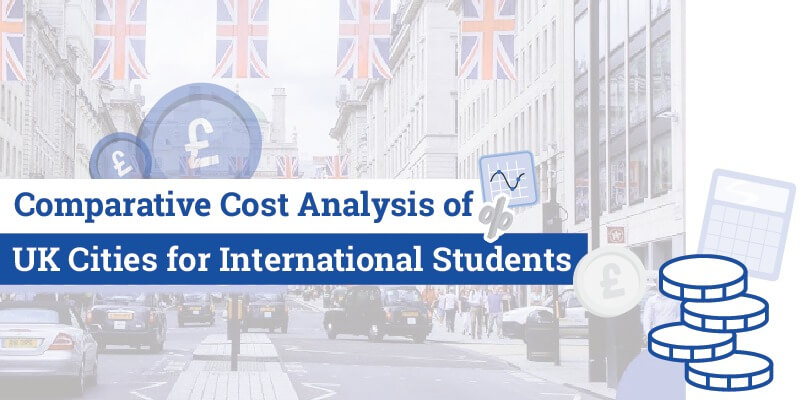Comparative Cost Analysis of UK Cities for International Students
Choosing the right city for your studies in the United Kingdom involves more than just academic considerations. The cost of living can significantly impact your overall student experience and financial planning. This comprehensive guide breaks down the living expenses across major UK student cities, providing you with the information you need to make an informed decision.
Methodology of Cost Comparison
Our analysis considers key factors:
- Accommodation costs: Including university halls, private rented rooms, and studio apartments.
- Utilities: Covering electricity, gas, water, and internet.
- Food and groceries: Considering both grocery shopping and eating out.
- Public transportation: Including bus, train, and tram fares.
- Entertainment and miscellaneous expenses: Such as social activities, leisure, and personal items.
We have gathered data from various sources, including:
- Official university websites: For information on accommodation costs and student support services.
- Government statistics: For data on average living costs and regional price variations.
- Student surveys: To gather insights from current international students
Detailed City Cost Breakdown
- London: The Prestigious Option
- Monthly Estimated Cost: £1,200 – £1,500 (as of [date])
- Accommodation:
- University Halls: £700 – £1,000 per month (bills often included)
- Private Rented Rooms: £600 – £900 per month (bills may be included)
- Studio Apartments: £1,200 – £1,600 per month (bills usually excluded)
- Pros:
- Unparalleled internship and job opportunities
- Extensive cultural experiences
- World-class universities and research facilities
- Cons:
- Highest cost of living in the UK
- Competitive housing market
- Higher everyday expenses
- Manchester: Northern Hub of Opportunity
- Monthly Estimated Cost: £900 – £1,200 (as of [date])
- Accommodation:
- University Halls: £500 – £700 per month (bills often included)
- Private Rented Rooms: £450 – £600 per month (bills may be included)
- Studio Apartments: £800 – £1,000 per month (bills usually excluded)
- Key Features:
- More affordable than London
- Vibrant student population
- Strong job market in tech and creative industries
- Edinburgh: Scottish Academic Hub
- Monthly Estimated Cost: £1,000 – £1,300 (as of [date])
- Accommodation:
- University Halls: £600 – £800 per month (bills often included)
- Private Rented Rooms: £500 – £700 per month (bills may be included)
- Studio Apartments: £900 – £1,100 per month (bills usually excluded)
- Important Considerations:
- Rich cultural heritage
- Lower costs compared to London
- Excellent academic environment
- Birmingham: Midlands Economic Center
- Monthly Estimated Cost: £850 – £1,100 (as of [date])
- Accommodation:
- University Halls: £500 – £650 per month (bills often included)
- Private Rented Rooms: £450 – £600 per month (bills may be included)
- Studio Apartments: £750 – £950 per month (bills usually excluded)
- Benefits for Students:
- More affordable living expenses
- Diverse job market
- Central location
- Bristol: Southwest Innovation Hub
- Monthly Estimated Cost: £950 – £1,250 (as of [date])
- Accommodation:
- University Halls: £600 – £750 per month (bills often included)
- Private Rented Rooms: £550 – £700 per month (bills may be included)
- Studio Apartments: £850 – £1,100 per month (bills usually excluded)
- Key Attractions:
- Strong startup ecosystem
- Balanced lifestyle
- Moderate living costs
- Cardiff: Wales’ Student-Friendly Capital
- Monthly Estimated Cost: £800 – £1,100 (as of [date])
- Accommodation:
- University Halls: £500 – £650 per month (bills often included)
- Private Rented Rooms: £450 – £600 per month (bills may be included)
- Studio Apartments: £700 – £900 per month (bills usually excluded)
- Advantages for Students:
- Most affordable capital city in the UK
- Vibrant, multicultural student population
- Lower cost of living compared to English cities
- Excellent universities with a strong international reputation
Comparative Analysis: Expanded Monthly Expenses
City | Accommodation | Utilities | Food
| Transport
| Entertainment
| Total Monthly Cost |
London | £800 | £150 | £300 | £150 | £200 | £1,600 |
Manchester | £550 | £120 | £250 | £100 | £150 | £1,170 |
Edinburgh | £650 | £130 | £270 | £120 | £180 | £1,350 |
Birmingham | £500 | £110 | £230 | £90 | £140 | £1,070 |
Bristol | £650 | £125 | £260 | £110 | £170 | £1,315 |
Cardiff | £500 | £100 | £220 | £80 | £130 | £1,030 |
Spotlight on Welsh Universities
Wales offers unique advantages for international students:
- Lower overall living costs
- High-quality education
- Internationally recognized universities
- Diverse and inclusive student communities
Money-Saving Tips for International Students
- Accommodation:
- Choose shared accommodations or consider university halls for the first year.
- Look for student-friendly neighborhoods with good transport links.
- Negotiate rent during off-peak seasons.
- Financial Management:
- Open a UK student bank account to access better deals and avoid high international transaction fees.
- Use student discount cards for various shops, restaurants, and attractions.
- Budget meticulously and track your expenses regularly.
- Explore part-time work opportunities to supplement your income.
- Additional Cost Reduction Methods:
- Prepare meals at home rather than dining out regularly.
- Utilize student travel passes for discounted public transport.
- Take advantage of free university and city events.
- Buy second-hand textbooks and supplies.
Conclusion
Selecting the right city involves balancing academic opportunities, living costs, and personal preferences. While London offers the most opportunities, cities like Manchester and Birmingham provide more affordable alternatives without compromising on quality education.
Recommended Next Steps:
- Research specific university costs, including tuition fees and additional expenses.
- Connect with current international students to gain firsthand insights into life in each city.
- Create a detailed personal budget to estimate your monthly living expenses.
- Consider scholarship and part-time work opportunities to help fund your studies.
Disclaimer:
Costs are approximate and can vary based on individual lifestyle, specific university, and annual changes. Always verify current prices and conduct personal research to ensure accurate cost estimates.







